Corporate Social Responsibilities and Ethics in Business Context
VerifiedAdded on 2020/03/01
|7
|1172
|227
Essay
AI Summary
This essay delves into the critical aspects of corporate social responsibility (CSR) and business ethics, analyzing real-world case studies to illustrate key concepts. The essay begins by examining the ethical failures of Enron, focusing on the company's aggressive business practices and fraudulent financial reporting that ultimately led to its collapse. The analysis highlights how Enron's actions breached the trust of stakeholders, including shareholders and regulatory bodies. The essay then evaluates Kellogg's CSR efforts, assessing whether the company's claims of social responsibility align with its actual practices, particularly concerning the health implications of its products. Furthermore, the discussion explores the Fair Trade movement, examining its role in promoting sustainable economic development for producers of raw materials and addressing issues such as labor practices. The essay concludes by emphasizing the responsibility of corporations towards the global community, acknowledging their dependence on various stakeholders and the broader societal context in which they operate.
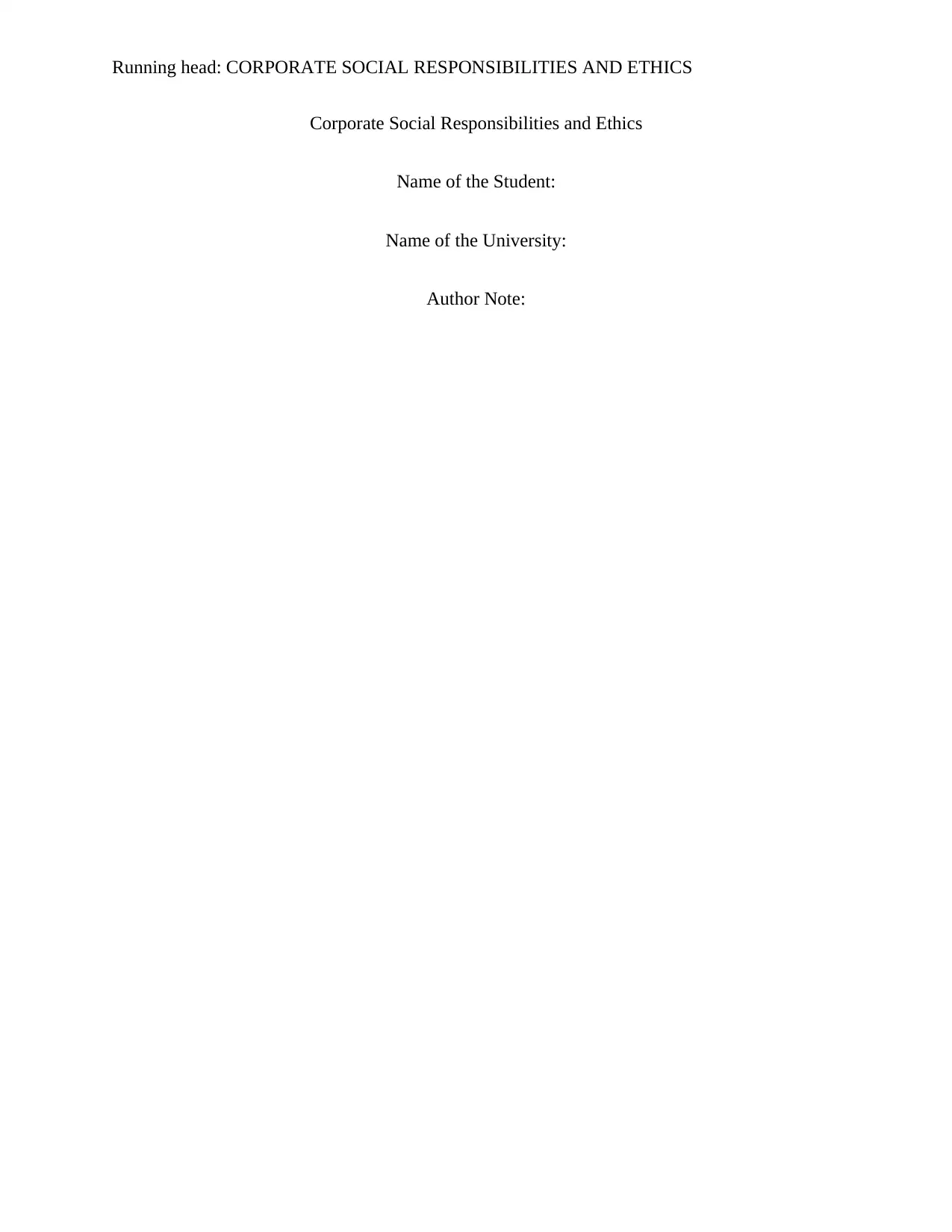
Running head: CORPORATE SOCIAL RESPONSIBILITIES AND ETHICS
Corporate Social Responsibilities and Ethics
Name of the Student:
Name of the University:
Author Note:
Corporate Social Responsibilities and Ethics
Name of the Student:
Name of the University:
Author Note:
Paraphrase This Document
Need a fresh take? Get an instant paraphrase of this document with our AI Paraphraser
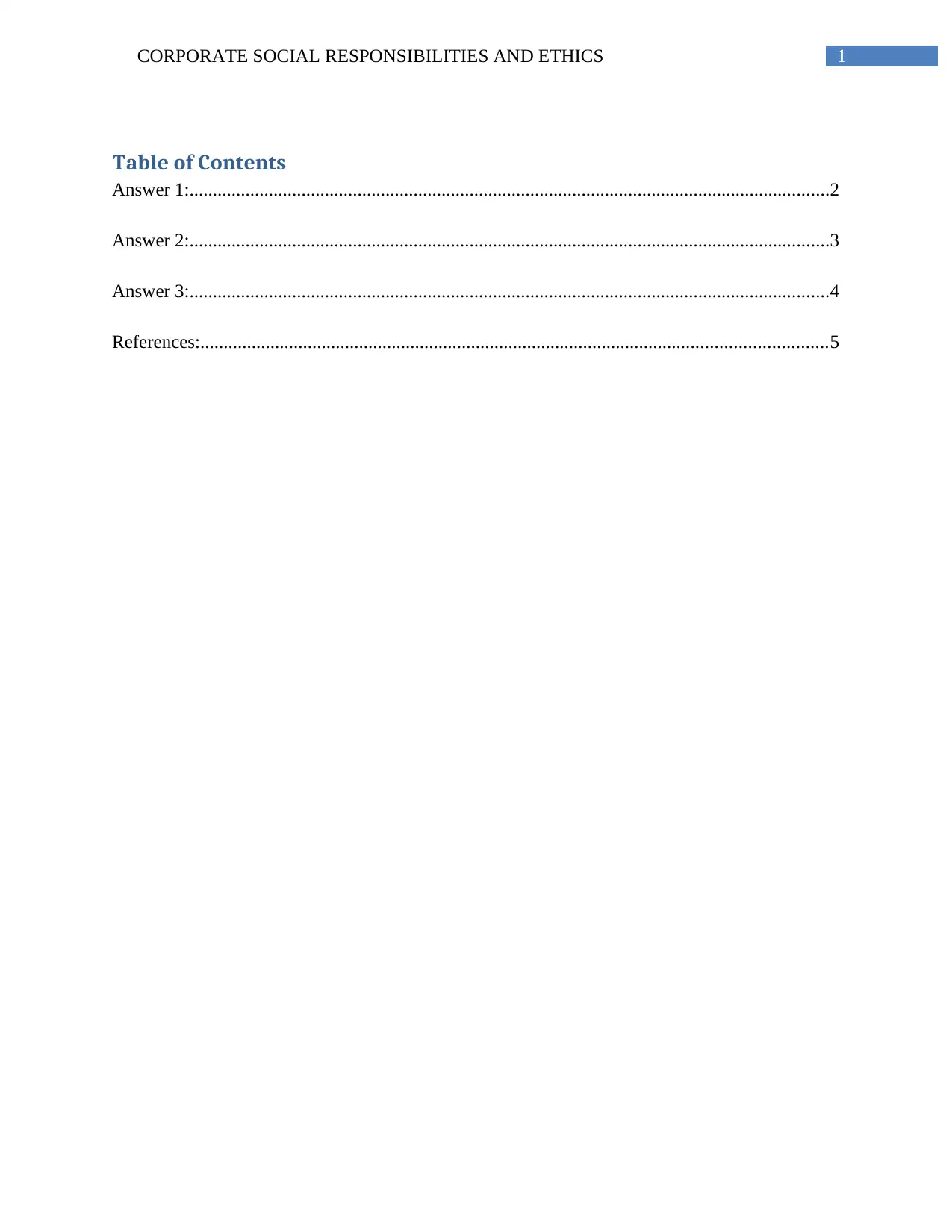
1CORPORATE SOCIAL RESPONSIBILITIES AND ETHICS
Table of Contents
Answer 1:.........................................................................................................................................2
Answer 2:.........................................................................................................................................3
Answer 3:.........................................................................................................................................4
References:......................................................................................................................................5
Table of Contents
Answer 1:.........................................................................................................................................2
Answer 2:.........................................................................................................................................3
Answer 3:.........................................................................................................................................4
References:......................................................................................................................................5
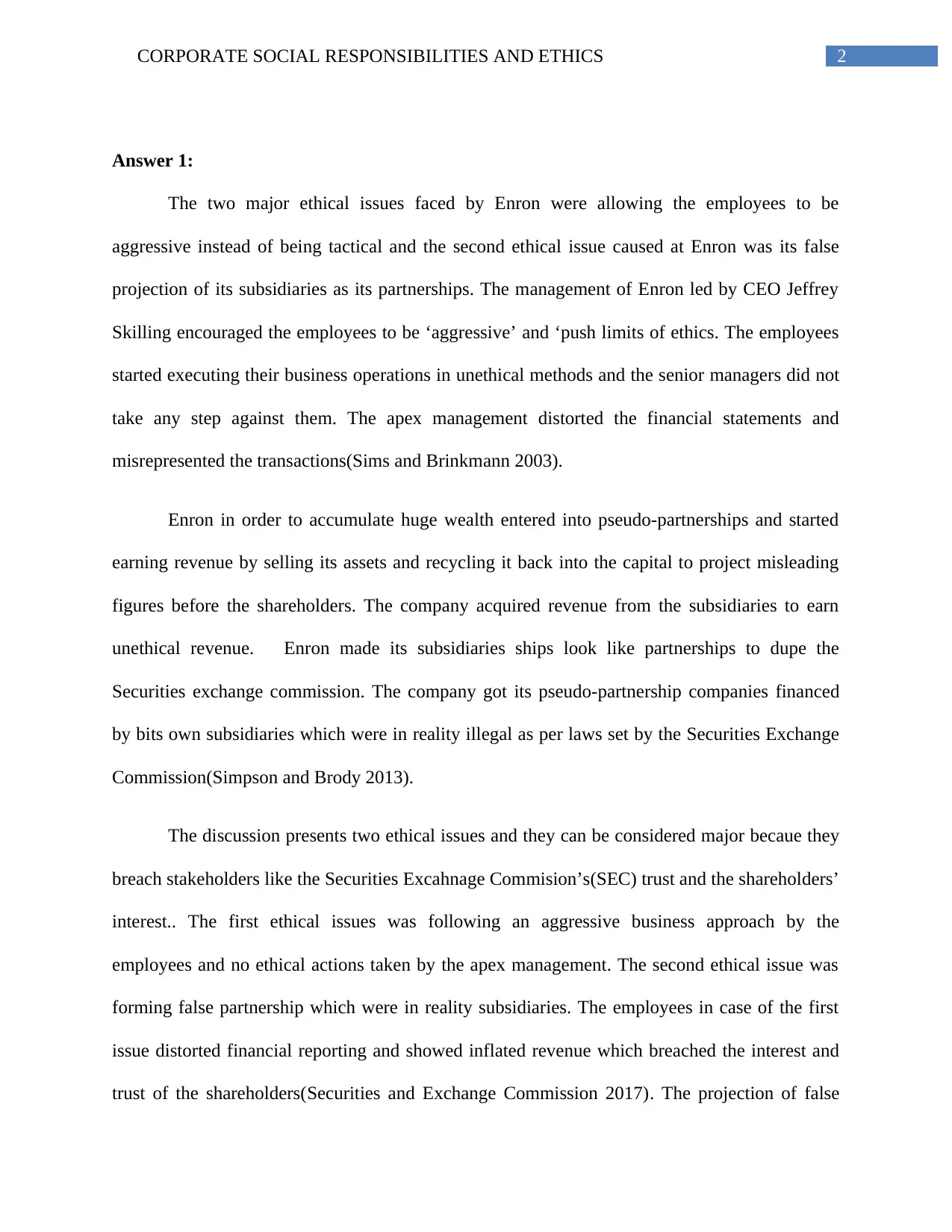
2CORPORATE SOCIAL RESPONSIBILITIES AND ETHICS
Answer 1:
The two major ethical issues faced by Enron were allowing the employees to be
aggressive instead of being tactical and the second ethical issue caused at Enron was its false
projection of its subsidiaries as its partnerships. The management of Enron led by CEO Jeffrey
Skilling encouraged the employees to be ‘aggressive’ and ‘push limits of ethics. The employees
started executing their business operations in unethical methods and the senior managers did not
take any step against them. The apex management distorted the financial statements and
misrepresented the transactions(Sims and Brinkmann 2003).
Enron in order to accumulate huge wealth entered into pseudo-partnerships and started
earning revenue by selling its assets and recycling it back into the capital to project misleading
figures before the shareholders. The company acquired revenue from the subsidiaries to earn
unethical revenue. Enron made its subsidiaries ships look like partnerships to dupe the
Securities exchange commission. The company got its pseudo-partnership companies financed
by bits own subsidiaries which were in reality illegal as per laws set by the Securities Exchange
Commission(Simpson and Brody 2013).
The discussion presents two ethical issues and they can be considered major becaue they
breach stakeholders like the Securities Excahnage Commision’s(SEC) trust and the shareholders’
interest.. The first ethical issues was following an aggressive business approach by the
employees and no ethical actions taken by the apex management. The second ethical issue was
forming false partnership which were in reality subsidiaries. The employees in case of the first
issue distorted financial reporting and showed inflated revenue which breached the interest and
trust of the shareholders(Securities and Exchange Commission 2017). The projection of false
Answer 1:
The two major ethical issues faced by Enron were allowing the employees to be
aggressive instead of being tactical and the second ethical issue caused at Enron was its false
projection of its subsidiaries as its partnerships. The management of Enron led by CEO Jeffrey
Skilling encouraged the employees to be ‘aggressive’ and ‘push limits of ethics. The employees
started executing their business operations in unethical methods and the senior managers did not
take any step against them. The apex management distorted the financial statements and
misrepresented the transactions(Sims and Brinkmann 2003).
Enron in order to accumulate huge wealth entered into pseudo-partnerships and started
earning revenue by selling its assets and recycling it back into the capital to project misleading
figures before the shareholders. The company acquired revenue from the subsidiaries to earn
unethical revenue. Enron made its subsidiaries ships look like partnerships to dupe the
Securities exchange commission. The company got its pseudo-partnership companies financed
by bits own subsidiaries which were in reality illegal as per laws set by the Securities Exchange
Commission(Simpson and Brody 2013).
The discussion presents two ethical issues and they can be considered major becaue they
breach stakeholders like the Securities Excahnage Commision’s(SEC) trust and the shareholders’
interest.. The first ethical issues was following an aggressive business approach by the
employees and no ethical actions taken by the apex management. The second ethical issue was
forming false partnership which were in reality subsidiaries. The employees in case of the first
issue distorted financial reporting and showed inflated revenue which breached the interest and
trust of the shareholders(Securities and Exchange Commission 2017). The projection of false
⊘ This is a preview!⊘
Do you want full access?
Subscribe today to unlock all pages.

Trusted by 1+ million students worldwide
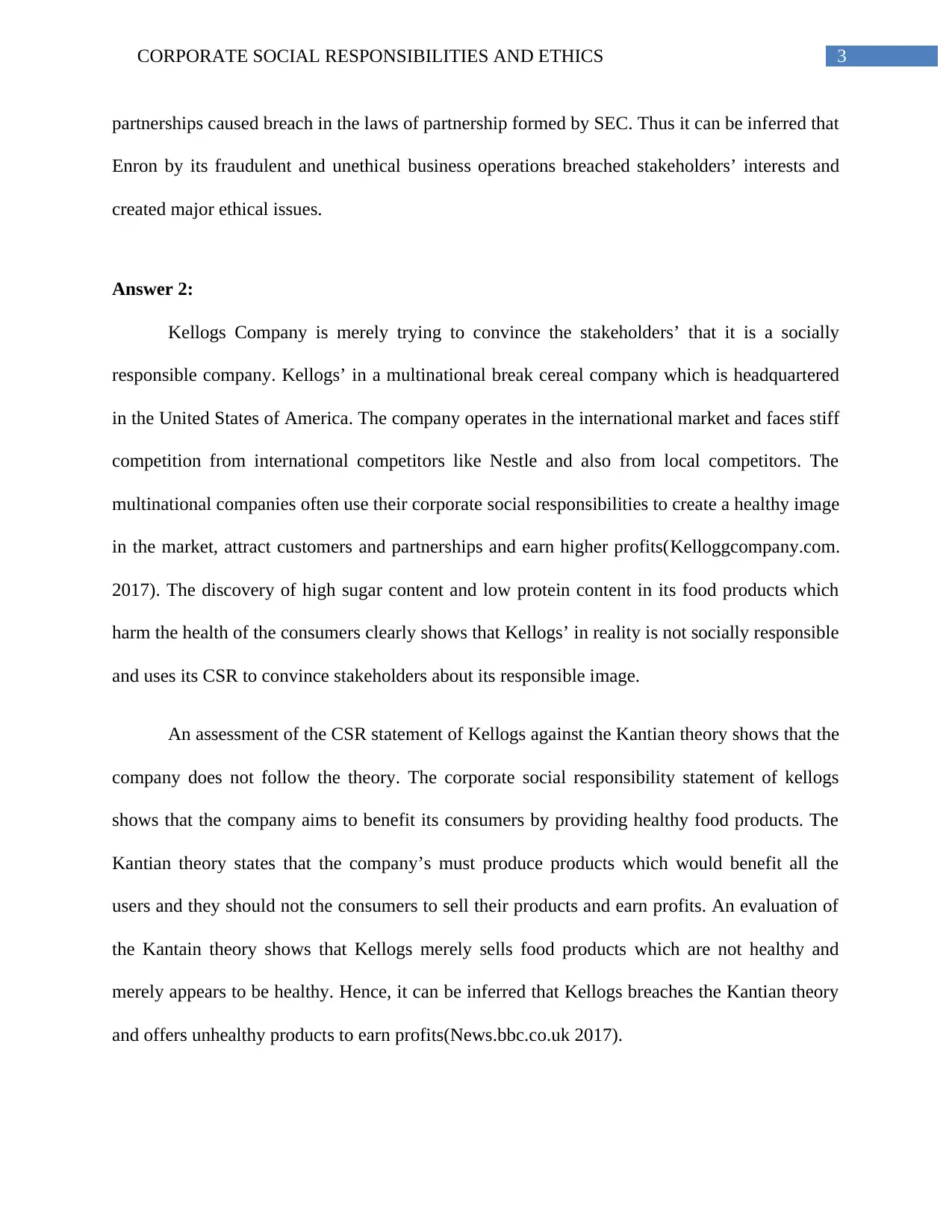
3CORPORATE SOCIAL RESPONSIBILITIES AND ETHICS
partnerships caused breach in the laws of partnership formed by SEC. Thus it can be inferred that
Enron by its fraudulent and unethical business operations breached stakeholders’ interests and
created major ethical issues.
Answer 2:
Kellogs Company is merely trying to convince the stakeholders’ that it is a socially
responsible company. Kellogs’ in a multinational break cereal company which is headquartered
in the United States of America. The company operates in the international market and faces stiff
competition from international competitors like Nestle and also from local competitors. The
multinational companies often use their corporate social responsibilities to create a healthy image
in the market, attract customers and partnerships and earn higher profits(Kelloggcompany.com.
2017). The discovery of high sugar content and low protein content in its food products which
harm the health of the consumers clearly shows that Kellogs’ in reality is not socially responsible
and uses its CSR to convince stakeholders about its responsible image.
An assessment of the CSR statement of Kellogs against the Kantian theory shows that the
company does not follow the theory. The corporate social responsibility statement of kellogs
shows that the company aims to benefit its consumers by providing healthy food products. The
Kantian theory states that the company’s must produce products which would benefit all the
users and they should not the consumers to sell their products and earn profits. An evaluation of
the Kantain theory shows that Kellogs merely sells food products which are not healthy and
merely appears to be healthy. Hence, it can be inferred that Kellogs breaches the Kantian theory
and offers unhealthy products to earn profits(News.bbc.co.uk 2017).
partnerships caused breach in the laws of partnership formed by SEC. Thus it can be inferred that
Enron by its fraudulent and unethical business operations breached stakeholders’ interests and
created major ethical issues.
Answer 2:
Kellogs Company is merely trying to convince the stakeholders’ that it is a socially
responsible company. Kellogs’ in a multinational break cereal company which is headquartered
in the United States of America. The company operates in the international market and faces stiff
competition from international competitors like Nestle and also from local competitors. The
multinational companies often use their corporate social responsibilities to create a healthy image
in the market, attract customers and partnerships and earn higher profits(Kelloggcompany.com.
2017). The discovery of high sugar content and low protein content in its food products which
harm the health of the consumers clearly shows that Kellogs’ in reality is not socially responsible
and uses its CSR to convince stakeholders about its responsible image.
An assessment of the CSR statement of Kellogs against the Kantian theory shows that the
company does not follow the theory. The corporate social responsibility statement of kellogs
shows that the company aims to benefit its consumers by providing healthy food products. The
Kantian theory states that the company’s must produce products which would benefit all the
users and they should not the consumers to sell their products and earn profits. An evaluation of
the Kantain theory shows that Kellogs merely sells food products which are not healthy and
merely appears to be healthy. Hence, it can be inferred that Kellogs breaches the Kantian theory
and offers unhealthy products to earn profits(News.bbc.co.uk 2017).
Paraphrase This Document
Need a fresh take? Get an instant paraphrase of this document with our AI Paraphraser
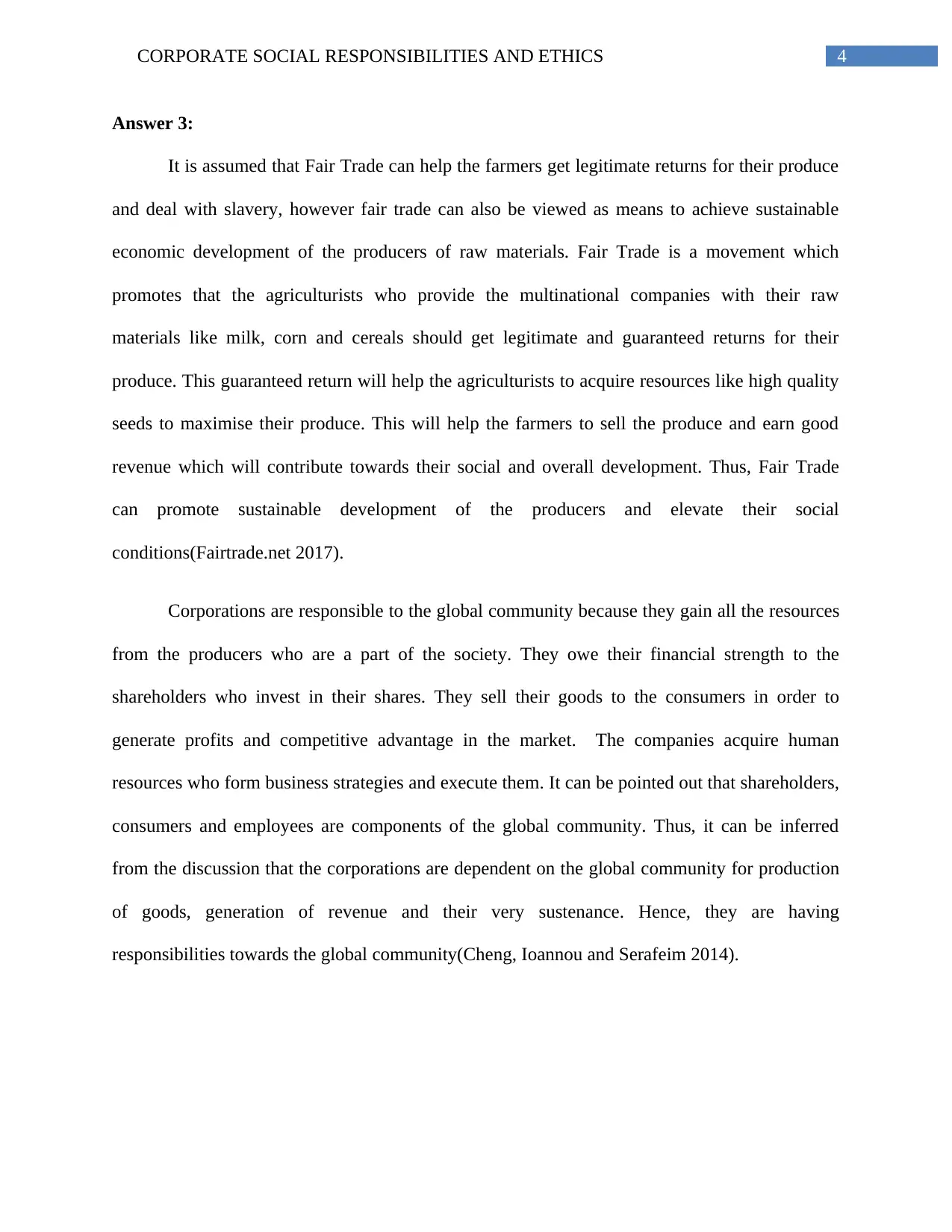
4CORPORATE SOCIAL RESPONSIBILITIES AND ETHICS
Answer 3:
It is assumed that Fair Trade can help the farmers get legitimate returns for their produce
and deal with slavery, however fair trade can also be viewed as means to achieve sustainable
economic development of the producers of raw materials. Fair Trade is a movement which
promotes that the agriculturists who provide the multinational companies with their raw
materials like milk, corn and cereals should get legitimate and guaranteed returns for their
produce. This guaranteed return will help the agriculturists to acquire resources like high quality
seeds to maximise their produce. This will help the farmers to sell the produce and earn good
revenue which will contribute towards their social and overall development. Thus, Fair Trade
can promote sustainable development of the producers and elevate their social
conditions(Fairtrade.net 2017).
Corporations are responsible to the global community because they gain all the resources
from the producers who are a part of the society. They owe their financial strength to the
shareholders who invest in their shares. They sell their goods to the consumers in order to
generate profits and competitive advantage in the market. The companies acquire human
resources who form business strategies and execute them. It can be pointed out that shareholders,
consumers and employees are components of the global community. Thus, it can be inferred
from the discussion that the corporations are dependent on the global community for production
of goods, generation of revenue and their very sustenance. Hence, they are having
responsibilities towards the global community(Cheng, Ioannou and Serafeim 2014).
Answer 3:
It is assumed that Fair Trade can help the farmers get legitimate returns for their produce
and deal with slavery, however fair trade can also be viewed as means to achieve sustainable
economic development of the producers of raw materials. Fair Trade is a movement which
promotes that the agriculturists who provide the multinational companies with their raw
materials like milk, corn and cereals should get legitimate and guaranteed returns for their
produce. This guaranteed return will help the agriculturists to acquire resources like high quality
seeds to maximise their produce. This will help the farmers to sell the produce and earn good
revenue which will contribute towards their social and overall development. Thus, Fair Trade
can promote sustainable development of the producers and elevate their social
conditions(Fairtrade.net 2017).
Corporations are responsible to the global community because they gain all the resources
from the producers who are a part of the society. They owe their financial strength to the
shareholders who invest in their shares. They sell their goods to the consumers in order to
generate profits and competitive advantage in the market. The companies acquire human
resources who form business strategies and execute them. It can be pointed out that shareholders,
consumers and employees are components of the global community. Thus, it can be inferred
from the discussion that the corporations are dependent on the global community for production
of goods, generation of revenue and their very sustenance. Hence, they are having
responsibilities towards the global community(Cheng, Ioannou and Serafeim 2014).
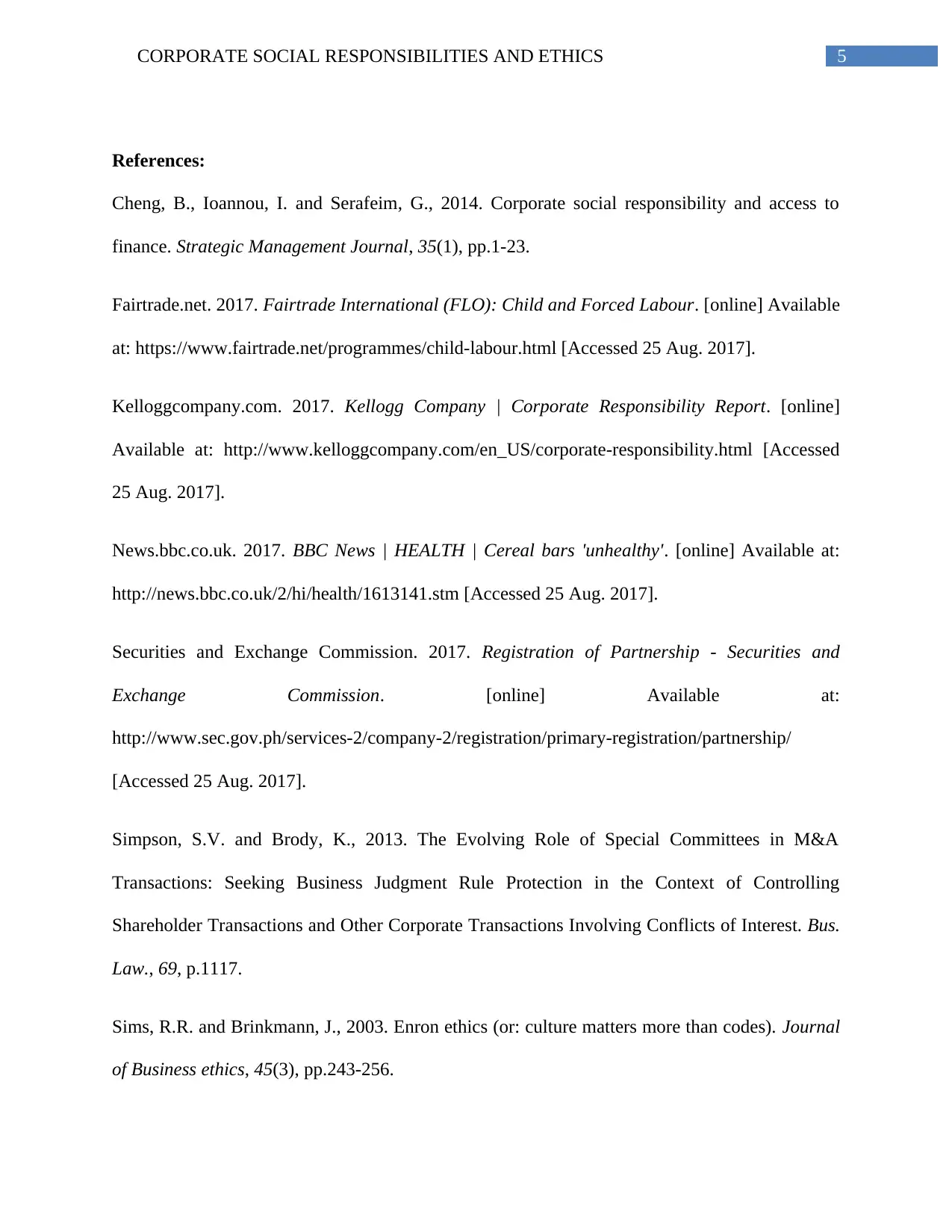
5CORPORATE SOCIAL RESPONSIBILITIES AND ETHICS
References:
Cheng, B., Ioannou, I. and Serafeim, G., 2014. Corporate social responsibility and access to
finance. Strategic Management Journal, 35(1), pp.1-23.
Fairtrade.net. 2017. Fairtrade International (FLO): Child and Forced Labour. [online] Available
at: https://www.fairtrade.net/programmes/child-labour.html [Accessed 25 Aug. 2017].
Kelloggcompany.com. 2017. Kellogg Company | Corporate Responsibility Report. [online]
Available at: http://www.kelloggcompany.com/en_US/corporate-responsibility.html [Accessed
25 Aug. 2017].
News.bbc.co.uk. 2017. BBC News | HEALTH | Cereal bars 'unhealthy'. [online] Available at:
http://news.bbc.co.uk/2/hi/health/1613141.stm [Accessed 25 Aug. 2017].
Securities and Exchange Commission. 2017. Registration of Partnership - Securities and
Exchange Commission. [online] Available at:
http://www.sec.gov.ph/services-2/company-2/registration/primary-registration/partnership/
[Accessed 25 Aug. 2017].
Simpson, S.V. and Brody, K., 2013. The Evolving Role of Special Committees in M&A
Transactions: Seeking Business Judgment Rule Protection in the Context of Controlling
Shareholder Transactions and Other Corporate Transactions Involving Conflicts of Interest. Bus.
Law., 69, p.1117.
Sims, R.R. and Brinkmann, J., 2003. Enron ethics (or: culture matters more than codes). Journal
of Business ethics, 45(3), pp.243-256.
References:
Cheng, B., Ioannou, I. and Serafeim, G., 2014. Corporate social responsibility and access to
finance. Strategic Management Journal, 35(1), pp.1-23.
Fairtrade.net. 2017. Fairtrade International (FLO): Child and Forced Labour. [online] Available
at: https://www.fairtrade.net/programmes/child-labour.html [Accessed 25 Aug. 2017].
Kelloggcompany.com. 2017. Kellogg Company | Corporate Responsibility Report. [online]
Available at: http://www.kelloggcompany.com/en_US/corporate-responsibility.html [Accessed
25 Aug. 2017].
News.bbc.co.uk. 2017. BBC News | HEALTH | Cereal bars 'unhealthy'. [online] Available at:
http://news.bbc.co.uk/2/hi/health/1613141.stm [Accessed 25 Aug. 2017].
Securities and Exchange Commission. 2017. Registration of Partnership - Securities and
Exchange Commission. [online] Available at:
http://www.sec.gov.ph/services-2/company-2/registration/primary-registration/partnership/
[Accessed 25 Aug. 2017].
Simpson, S.V. and Brody, K., 2013. The Evolving Role of Special Committees in M&A
Transactions: Seeking Business Judgment Rule Protection in the Context of Controlling
Shareholder Transactions and Other Corporate Transactions Involving Conflicts of Interest. Bus.
Law., 69, p.1117.
Sims, R.R. and Brinkmann, J., 2003. Enron ethics (or: culture matters more than codes). Journal
of Business ethics, 45(3), pp.243-256.
⊘ This is a preview!⊘
Do you want full access?
Subscribe today to unlock all pages.

Trusted by 1+ million students worldwide
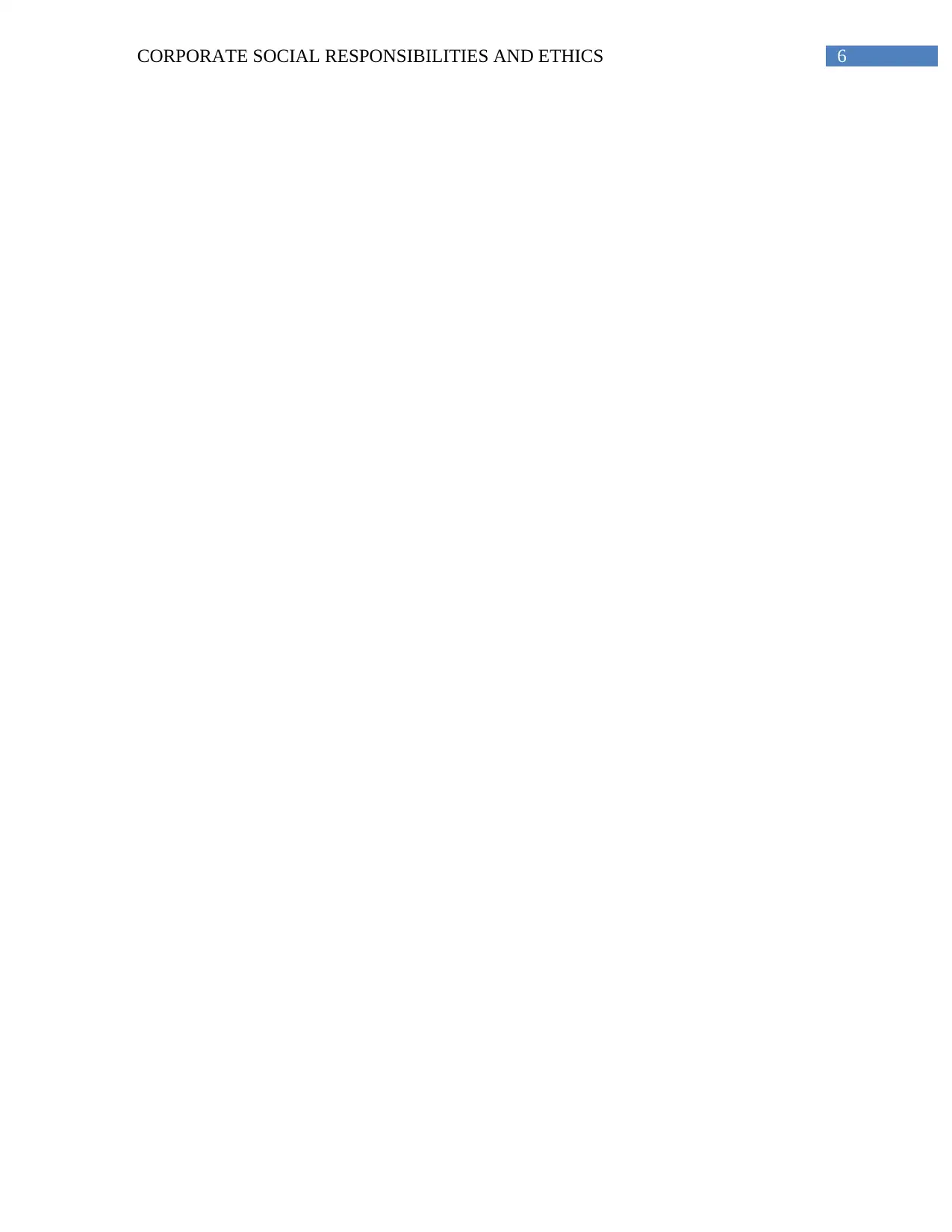
6CORPORATE SOCIAL RESPONSIBILITIES AND ETHICS
1 out of 7
Related Documents
Your All-in-One AI-Powered Toolkit for Academic Success.
+13062052269
info@desklib.com
Available 24*7 on WhatsApp / Email
![[object Object]](/_next/static/media/star-bottom.7253800d.svg)
Unlock your academic potential
Copyright © 2020–2026 A2Z Services. All Rights Reserved. Developed and managed by ZUCOL.




